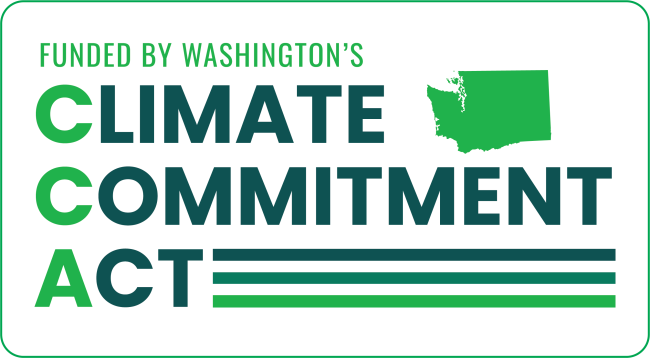Green Transportation Capital
Green Transportation Capital grants provide funding to transit agencies for cost-effective capital projects that reduce the carbon intensity of the Washington transportation system.
This grant is supported by state funding from Washington’s Climate Commitment Act (CCA) (76.7 percent). The CCA supports Washington’s climate action efforts by putting cap-and-invest dollars to work reducing climate pollution, creating jobs, and improving public health. Information about the CCA is available at www.climate.wa.gov.
This grant is also supported by funding from the Multimodal Account (23.3 percent).

This grant is established under RCW 47.66.120.
Grant award amount
The Legislature funded $31,326,959 for the 2025-2027 biennium to support this program.
Eligible applicants
Any transit agency in Washington state is an eligible applicant. A transit agency is defined as:
- City transit system under RCW 35.58.2721 or chapter 35.95A RCW
- County public transportation authority under chapter 36.57 RCW
- Metropolitan municipal corporation transit system under chapter 36.56 RCW
- Public transportation benefit area under chapter 36.57A RCW
- Unincorporated transportation benefit area under RCW 36.57.100
- Regional transit authority under chapter 81.112 RCW
- Special purpose district formed to operate a public transportation system
Eligible projects and related costs
Vehicles, equipment, and zero-emission transition plan applications must be two-year projects only. Construction projects may be two or four years.
Capital projects and related expenditures may include:
- Electrification of transit vehicle fleets, including battery and fuel cell operated electric vehicles.
- Updating or modifying facilities for fleet electrification and/or hydrogen refueling infrastructure.
- New facilities that directly and primarily support fleet electrification.
- Construction of charging and fueling stations to support transit fleet electrification.
- Necessary upgrades to electrical transmission and distribution systems.
- In-house staff directly managing a capital construction project.
- Acquisition of property rights for capital projects.
Zero-emission fleet transition planning activities may also be an eligible project (contingent upon legislative appropriation of funding).
Match requirement
Applicants must provide matching funds in the form of direct contributions at a certain percentage of total project costs. Direct contributions are cash or assets that directly benefit the project and are fundamental to implementing the project.
The Green Transportation Capital Grant program uses a tiered match system to determine the minimum required match an applicant must provide. Match is determined by the transit agency's most recent operating budget.
| Tier level | Operating budget | Required match |
|---|---|---|
| Tier 1 | $35 million or more | 20 percent |
| Tier 2 | $20 million to $34.9 million | 15 percent |
| Tier 3 | $10 million to $19.9 million | 10 percent |
| Tier 4 | $5 million to $9.9 million | 5 percent |
| Tier 5 | Less than $4.9 million | No match required |
Previous eligible expenditures directly associated with the proposed project may qualify as match. With the exception of competitive state-funded grants administered by WSDOT’s Public Transportation Division, applicants may use other grants as match.
Evaluation process
We use a competitive process for awards from the Green Transportation Capital Grant program. Designated members of the Green Transportation Capital Grant Advisory Committee will review applications and recommend projects for award to us. The committee includes representatives from WSDOT; Department of Ecology; Department of Commerce; Utilities and Transportation Commission; Washington State University; and large urban, small urban, and rural transit agencies.
Evaluation criteria
The maximum score on an application is 100 points. Each criterion can receive a maximum of 20 points.
Criterion for the Green Transportation Capital Grant program include:
- Project description: Responses clearly describe the project scope of work, goals, measurable objectives, and anticipated results.
- Scalability, sustainability, and support: Responses clearly describe how the project advances the green transportation goals of the transit agency, the scalability of the project, and the extent to which the transit agency has coordinated with necessary partners to successfully implement the project.
- Project benefits: Responses connect project benefits to reductions in carbon emissions, including how the project addresses environmental harms and provides environmental benefits for overburdened communities and vulnerable populations.
- Project budget and cost effectiveness: Project's request for grant funds is reasonable and reductions in carbon emissions provided by the proposed project are cost effective.
- Readiness to proceed and schedule: Applicant can feasibly and successfully implement the proposed project by the end of the grant period.
Awards
The Green Transportation Capital grants table below shows eight projects awarded approximately $31.3 million for the 2025-2027 biennium.
| Organization | County/counties | Project title | Award |
|---|---|---|---|
| Chelan Douglas Public Transportation Benefit Area (Link Transit) | Chelan, Douglas | Urban bus fleet replacement and electric bus charging infrastructure | $4,568,750 |
| City of Everett (Everett Transit) | Snohomish | Transit maintenance facility engineering and design | $1,976,250 |
| City of Everett (Everett Transit) | Snohomish | Inductive charging at Everett Station | $2,550,000 |
| King County Metro Transit | King | Metro Central Base Campus zero electrification, design | $2,990,434 |
| King County Metro Transit | King | Metro 40ft transit battery electric bus purchase | $7,823,200 |
| Snohomish County Public Transit Benefit Area Corp. (Community Transit) | Snohomish | Charging Infrastructure at Hardeson Campus | $8,000,000 |
| Spokane Transit Authority (STA) | Spokane | Battery Electric Bus (BEB) on-route charging infrastructure | $3,208,000 |
| Spokane Transit Authority (STA) | Spokane | Electric operations support vehicles | $210,325 |
Sign up for grant updates
To stay informed about WSDOT public transportation grants, you can register in GovDelivery.
Slow down – lives are on the line.
Excessive speed was a top cause of work zone collisions in 2024.
Phone down, eyes up.
Work zones need our undivided attention.
It's in EVERYONE’S best interest.
96% of people hurt in work zones are drivers, their passengers or passing pedestrians, not just our road crews.
